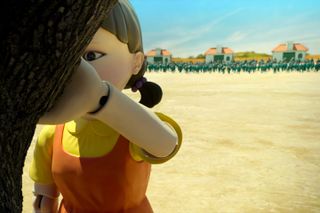Shocking no one, real-life Squid Game seems to have been a bad idea
Who could possibly have guessed.

Last year Netflix announced it was filming a 10-episode series called Squid Game: The Challenge, inspired by the mega-popular Korean series in which poor people are exploited by being offered incredible amounts of money if they can survive a series of cruel games. In Netflix's reality show version, contestants were offered $4.56 million to compete in games based on those from the show, with the difference being that nobody would die. In addition to being conceptually tone-deaf, a report by Rolling Stone suggests this game show was filmed in inhumane conditions, and may even have been rigged.
Four competitors spoke out under condition of anonymity, discussing a version of the show's game called "Red Light, Green Light" in the subtitles and "Mugunghwa kkochi pieot seumnida" in the original Korean. They told Rolling Stone they were driven from London to a hanger in a former Air Force base with concrete floors, where they filmed for up to nine hours in temperatures so low that even with two layers of thermals under their tracksuits one player said she developed pneumonia and an ear infection.
Additionally, in between the several seconds during which contestants could run for the finish line, they were apparently forced to stand immobile for half an hour so drone shots could be taken and footage reviewed while the producers decided which players were to be eliminated. Those who moved had blood squibs in their tracksuits set off, in imitation of the show's sniper fire.
The anonymous sources claimed at least 10 contestants collapsed during this game, and one said that medics took a long time reaching fallen players because the producers were concerned they would interfere with camera shots. One player claims he suffered a herniated disc and tore a tendon in his knee. In a surreal detail, people wearing the original show's trademark pink jumpsuits and masks were apparently sent out with black coffins to block the cameras' view of medics assisting fallen players while the rest continued standing immobile.
What's more, the former contestants claim Squid Game: The Challenge was rigged in favor of pre-decided competitors, among them several Instagram and TikTok influencers, who had working microphones during the challenge while others were left with fakes. Two of the contestants said when they were given their flights to London, they noticed return tickets were also booked for dates before the end of the competition, for dates that lined up with their eventual eliminations.
Three of the contestants alleged that a number of players who made it across the finish line with time left on the clock had their blood squibs go off after the fact—several minutes after—and were told they failed and were being sent home. One contestant also said they saw a player who should have been eliminated being given a second chance.
Netflix and production companies The Garden and Studio Lambert gave a statement in response, saying that "any suggestion that the competition is rigged or claims of serious harm to players are simply untrue" and "We've taken all the appropriate safety precautions, including after care for contestants—and an independent adjudicator is overseeing each game to ensure it's fair to everyone."
PC Gamer Newsletter
Sign up to get the best content of the week, and great gaming deals, as picked by the editors.
This wasn't the only attempt to bring Squid Game to life, with YouTuber MrBeast making a $3.5 million recreation of the show. Regardless of the truth behind the allegations against Netflix's reality show competition, the existence of these recreations is a reminder that no matter how blatantly a work of fiction makes its point, a substantial and depressing number of people will just think, "Wow!! Cool game show!"

Jody's first computer was a Commodore 64, so he remembers having to use a code wheel to play Pool of Radiance. A former music journalist who interviewed everyone from Giorgio Moroder to Trent Reznor, Jody also co-hosted Australia's first radio show about videogames, Zed Games. He's written for Rock Paper Shotgun, The Big Issue, GamesRadar, Zam, Glixel, Five Out of Ten Magazine, and Playboy.com, whose cheques with the bunny logo made for fun conversations at the bank. Jody's first article for PC Gamer was about the audio of Alien Isolation, published in 2015, and since then he's written about why Silent Hill belongs on PC, why Recettear: An Item Shop's Tale is the best fantasy shopkeeper tycoon game, and how weird Lost Ark can get. Jody edited PC Gamer Indie from 2017 to 2018, and he eventually lived up to his promise to play every Warhammer videogame.
Most Popular





